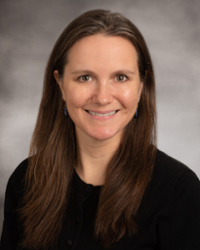Caroline Peacock, DMin, LCSW, M.Div
Dr. Caroline Peacock is an ACPE Certified Educator, Board Certified Chaplain, and Licensed Clinical Social Worker. She received her training in social work at City University of New York, Hunter College School of Social Work. She attended seminary at General Theological Seminary in New York and is an Episcopal priest.
Dr. Peacock engaged in spiritual health training (residency and ACPE certified educator training) at Emory Healthcare and was certified in 2018. She is a CBCT instructor, CCSH Registered Clinician, and co-developer of the CCSH-Team Interventions for use with healthcare professionals. In 2021, she co-founded the Transforming Chaplaincy Psychedelic Care Network and received a certificate in Psychedelic Studies from Naropa University. Dr. Peacock earned a Doctor of Ministry from Emory University Candler School of Theology with a research focus on the role of spiritual health professionals in psychedelic assisted therapy.
Current Positions & Responsibilities
- Director of Care Transformation for Emory Spiritual Health.
- Director of Spiritual Health program for Winship Cancer Institute.
Meet Caroline Peacock
As Director of Spiritual Health for the Winship Cancer Institute Caroline is responsible for overseeing the provision of spiritual and emotional support to patients, families and staff members across the Winship component sites. Caroline is also the Certified Educator working with Spiritual Health residents at EUH. Winship Spiritual Health Clinicians are available at EUH, EUHM, and ESJH, offering professional, compassionate and effective spiritual health assessment and intervention.
Caroline’s vision for spiritual health includes provision of care to all persons, with a broad array of religious, cultural and philosophical identities and perspectives. Caroline’s vision for spiritual health is full integration of spiritual health within the healthcare system, ensuring compassionate and effective companionship to persons in moments of suffering, transition, and distress.
Awards
Most Recent Publications
- Pasricha, I. Peacock, C, Palitsky, R, Clark-Soles, J, Maples-Keller, JL, Grang, G.H., Kaplan, D. (2025). Spiritual health practitioners reveal key motivations in psychedelic-assisted therapy practice. Psychedelics. Genomics Press. DOI: 10.61373/pp025r.0008
- Palitsky, R., Captari, L. E., Maples-Keller, J. L., Peacock, C., Rupert, D., Kaplan, D. M., Stavros, G., Grant, G. H., & Sandage, S. J. (2025). Applying relational spirituality to develop spiritual and religious competencies in psychedelic-assisted psychotherapy training. Psychotherapy. Advance online publication. https://doi.org/10.1037/pst0000594
- Palitsky, R., Maples-Keller, J. L., Peacock, C., Dunlop, B. W., Mletzko, T., Grant, G. H., Raison, C. L., Chao, S., Shub, I., Mendelbaum-Kweller, M., Smolyar, L., Kaplan, D. M., Rothbaum, B. O., & Zarrabi, A. J. (2025). A critical evaluation of psilocybin-assisted therapy protocol components from clinical trial patients, facilitators, and caregivers. Psychotherapy. https://doi.org/10.1037/pst0000551
- Palitsky R, Kaplan DM, Perna J, Bosshardt Z, Maples-Keller JL, Levin-Aspenson HF, Zarrabi AJ, Peacock C, Mletzko T, Rothbaum BO, Raison CL, Grant GH, Dunlop BW. A framework for assessment of adverse events occurring in psychedelic-assisted therapies. J Psychopharmacology. 2024 Aug;38(8):690-700. doi: 10.1177/02698811241265756.
- Peacock C, Mascaro, JS, Brauer E, Zarrabi, AJ, Dunlop BW, Maples-Keller L, Grant GH, Raison CL, Rab F, Palitsky R. Spiritual health practitioners’ contributions to psychedelic assisted therapy: A qualitative analysis. PLOS One. 2024. https://doi.org/10.1371/journal.pone.0296071
- Palitsky R, Kaplan DM, Peacock C, et al. Importance of Integrating Spiritual, Existential, Religious, and Theological Components in Psychedelic-Assisted Therapies. JAMA Psychiatry. 2023;80(7):743–749. doi:10.1001/jamapsychiatry.2023.1554
- Peacock C, Mascaro JS, Brauer E, Zarrabi AJ, Dunlop BW, Maples-Keller JL, Grant GH, Raison CL, Rab F, Palitsky R. Spiritual health practitioners' contributions to psychedelic assisted therapy: A qualitative analysis. PLoS One. 2024 Jan 2;19(1):e0296071. doi: 10.1371/journal.pone.0296071. PMID: 38166057; PMCID: PMC10760908.
- Panzer, P.G., Desai, P., Peacock, C. (2022). Traumatic Stress in the Community: Identification and Intervention. In: Sowers, W.E., McQuistion, H.L., Ranz, J.M., Feldman, J.M., Runnels, P.S. (eds) Textbook of Community Psychiatry. Springer, Cham. https://doi.org/10.1007/978-3-031-10239-4_16
- Mascaro, J. S., Palmer, P. K., Ash, M. J., Peacock, C., Sharma, A., Escoffery, C., & Raison, C. (2021). Incivility is associated with Burnout and Reduced Compassion Satisfaction: A Mixed-Method Study to Identify Causes of Burnout among Oncology Clinical Research Coordinators in the International Journal of Environmental Research and Public Health
- Mascaro, J. S., Palmer, P. K., Ash, M. J., Peacock, C., Sharma, A., Escoffery, C., & Raison, C. (2021). Feasibility, Acceptability, and Preliminary Effectiveness of a Compassion-Centered Team Intervention to Improve Clinical Research Coordinator Resilience and Well-Being. JCO Oncology Practice, OP-21.
